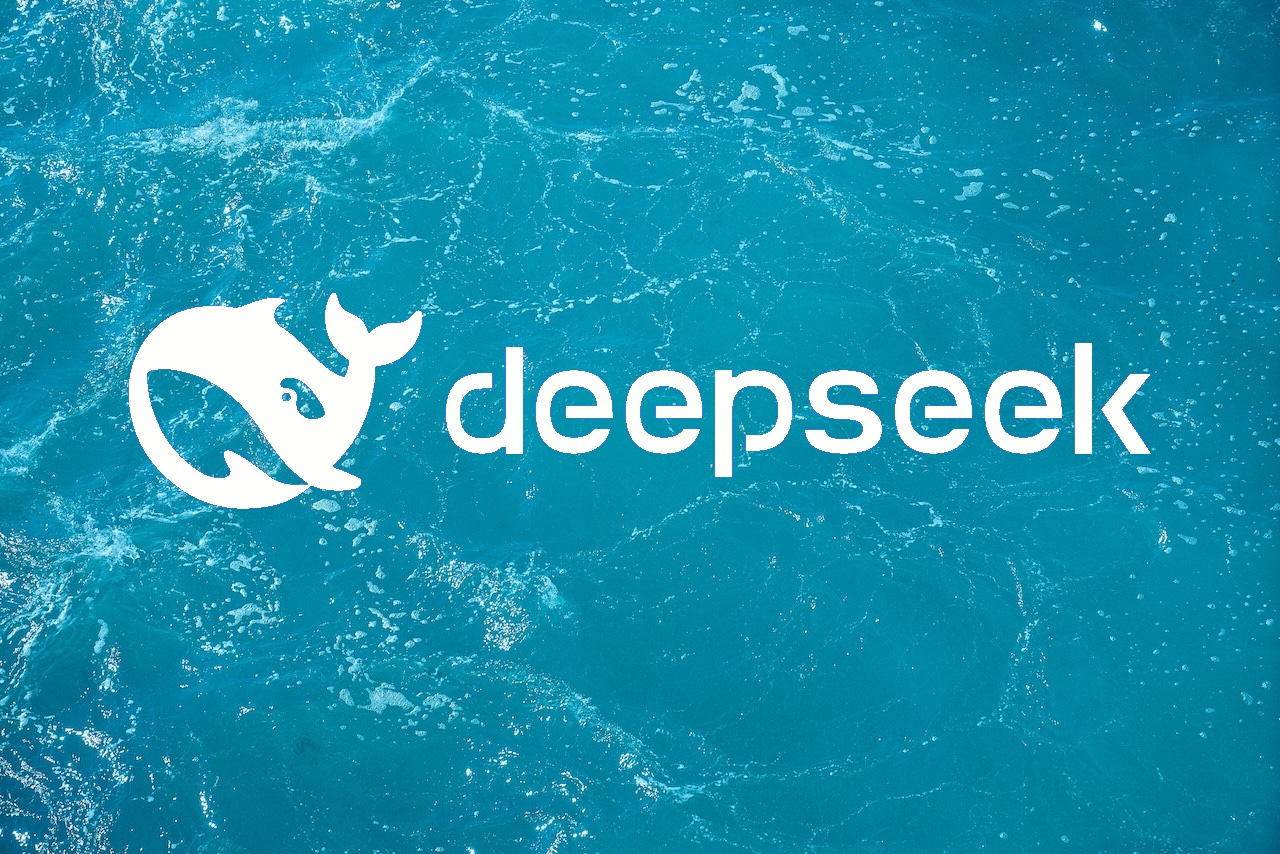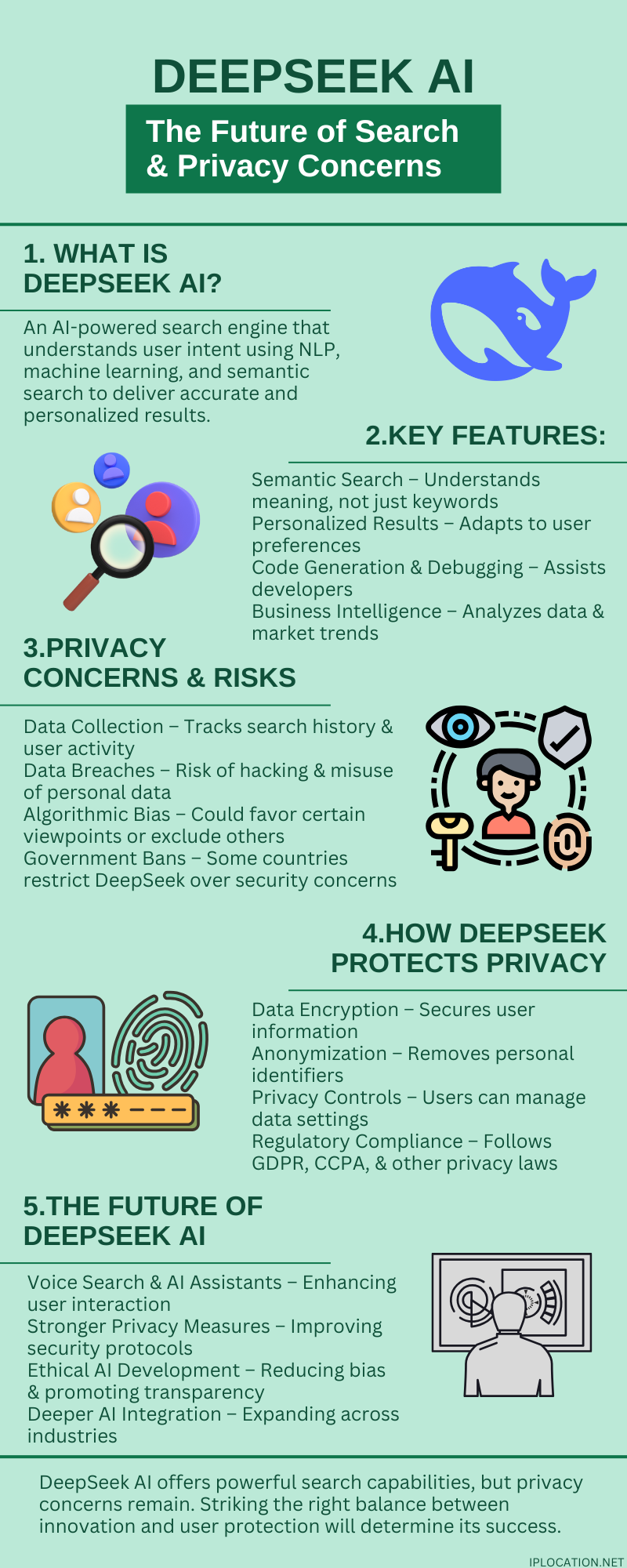
DeepSeek AI is a next-generation search engine designed to provide more accurate, contextual, and intelligent search results. Unlike traditional search engines that rely on keyword matching, DeepSeek AI understands user intent using advanced natural language processing (NLP), machine learning, and semantic search.
DeepSeek, a Chinese AI platform, has raised significant privacy concerns due to its data handling practices and potential security vulnerabilities. Investigations have revealed that the DeepSeek iOS app transmits device information without encryption, making user data susceptible to interception and unauthorized access. Some countries have even restricted its access due to these concerns. This article explores DeepSeek AI’s features, advantages, privacy risks, and the steps taken to protect user data.
 
How DeepSeek AI Works: Key Features & Capabilities
1. Advanced Search Technology
DeepSeek AI leverages neural networks, transformer models, and NLP to analyze the meaning behind search queries, resulting in more relevant and personalized search results.
Key Features:
- Semantic Search: Understands user intent rather than just matching keywords.
- Personalized Results: Adapts search rankings based on user preferences and past behavior.
- Multi-Language Support: Provides high-quality translations for global users.
- Content Discovery: Uncovers sources that traditional search engines might overlook.
2. AI-Powered Code Generation & Debugging
DeepSeek AI is not just a search engine—it also acts as a coding assistant, capable of writing, analyzing, and debugging code across multiple programming languages.
- Generates code snippets based on natural language prompts.
- Finds and fixes coding errors quickly, improving developer efficiency.
- Provides smart suggestions for optimizing performance and security.

3. Business Intelligence & Data Analysis
DeepSeek AI can process large volumes of data to generate market insights, competitor analysis, and business strategies. It helps businesses identify patterns, predict trends, and make data-driven decisions.
- Analyzes customer sentiment from online reviews & social media.
- Provides predictive insights for marketing & product development.
- Helps researchers find academic papers & relevant industry reports.
Privacy Concerns: Risks & Ethical Considerations
DeepSeek, a Chinese AI company, is subject to China’s Data Security Law (DSL) and Cybersecurity Law, which mandate that companies operating within China must comply with government requests for data access. These laws require organizations to provide data to Chinese authorities upon request, without the ability to refuse. Consequently, DeepSeek is legally obligated to share user data with the Chinese government when such requests are made, raising significant concerns about user privacy and data security.
1. Data Collection & Usage
DeepSeek AI collects user data to enhance search accuracy and personalization. This includes:
- Personal Information: Name, email, location (if permitted).
- Search History: Past queries to refine search results.
- Usage Patterns: Click behavior, interaction history.
Risk: While personalization improves search quality, excessive data collection can lead to privacy breaches, targeted surveillance, and data misuse.
2. Potential for Data Breaches & Misuse
Like any AI system, DeepSeek AI is vulnerable to cyberattacks and insider threats.
- Encryption & anonymization help secure data, but breaches remain a risk.
- Unauthorized access to user search history could lead to privacy violations.
- Data scraping by third parties could expose sensitive information.
Real-World Impact: Some countries have banned DeepSeek AI, citing concerns over data security, national sovereignty, and potential government surveillance.
3. Algorithmic Bias & Fairness Issues
AI systems are only as good as the data they are trained on. If DeepSeek AI’s training data contains biases, it may produce unfair or discriminatory results.
- Biased search rankings could favor certain viewpoints over others.
- Discriminatory algorithms could unintentionally marginalize certain groups.
- Misinformation risks arise if DeepSeek AI amplifies unreliable sources.
Solution: Ethical AI development, transparency in ranking algorithms, and regular audits are needed to ensure fairness and prevent bias.

How DeepSeek AI Protects User Privacy
DeepSeek has implemented several measures to protect user privacy. According to their privacy policy, the company processes personal information in connection with their apps, websites, software, and related services, enabling users to create and interact with chatbots. The policy specifies that personal information collected from end users accessing applications developed by third-party developers using DeepSeek’s open platform services is not covered under this policy; instead, the respective developers are responsible for disclosing their personal information protection policies to end users.
Despite these measures, concerns have been raised regarding DeepSeek’s data handling practices. Reports indicate that the DeepSeek iOS app transmits some registration and device data over the internet without encryption, exposing this information to potential passive and active attacks. Additionally, the app globally disables App Transport Security (ATS), an iOS platform-level protection that prevents sensitive data from being sent over unencrypted channels, thereby increasing the risk of data exposure.
1. Data Encryption & Anonymization
DeepSeek AI encrypts user data and employs anonymization techniques to prevent unauthorized access.
- Encryption: Converts data into unreadable code, protecting sensitive information.
- Anonymization: Removes personal identifiers from search logs.
2. Transparency & User Control
DeepSeek AI provides clear privacy policies and user control features, allowing individuals to manage their data and opt out of personalized tracking.
- Privacy Settings: Users can adjust what data is collected.
- Clear Disclosures: DeepSeek AI informs users about how their data is used.
3. Compliance with Global Privacy Laws
DeepSeek AI follows strict privacy regulations like:
- GDPR (Europe) – Limits data collection & ensures user rights.
- CCPA (California) – Gives users control over personal data.
- Other National Regulations – Adapts to country-specific privacy laws.
The Future of DeepSeek AI: Balancing Innovation & Privacy
To address privacy issues and enhance user privacy, it is recommended that DeepSeek implements robust encryption protocols for data transmission and storage, ensures compliance with international data protection standards, and provides users with clear options to manage their data preferences. Regular security audits and transparent communication about data handling practices can further bolster user trust and privacy protection.
1. Expanding Features & AI Integration
- Enhanced Personalization: More accurate, adaptive search results.
- Voice Search & AI Assistants: Seamless, hands-free search experience.
- Integration with AI-powered platforms: Expanding AI’s role in research, content creation, and business intelligence.
2. Strengthening Privacy Measures
- Privacy by Design: Embedding security into AI systems from development.
- User Awareness Initiatives: Educating users on safe AI practices.
- Regulatory Collaboration: Partnering with governments for ethical AI governance.

Conclusion
DeepSeek AI represents the future of search technology, offering greater accuracy, personalization, and AI-driven insights. However, its rise also raises critical privacy concerns related to data security, surveillance, and algorithmic bias.
As AI continues to evolve, it is essential to strike a balance between innovation and ethical responsibility. By enhancing privacy protections, promoting transparency, and following ethical AI practices, DeepSeek AI can redefine the digital search experience while safeguarding user trust.
Images by Freepik.
Share this post
Leave a comment
All comments are moderated. Spammy and bot submitted comments are deleted. Please submit the comments that are helpful to others, and we'll approve your comments. A comment that includes outbound link will only be approved if the content is relevant to the topic, and has some value to our readers.



Comments (0)
No comment